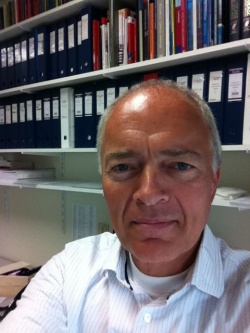RESPONSE trial results
Studies show that when a nurse follows patients after a cardiovascular crisis those patients stay healthier, live longer and reduce the risk of returning to hospital. Now the challenge is how to convince insurers to pay for this care, reports John Brosky.

Nothing beats a heart attack to motivate someone to exercise regularly, stop smoking and lose weight.
Yet, left to themselves, after a few weeks cardiovascular patients return to the bad habits that brought on the crisis in the first place – and, sooner or later they find themselves back in a hospital bed.
To break this cycle and help keep patients out of the hospital, along with medications a cardiologist should prescribe a nurse to help improve a patient's prognosis, according to Ron Peters MD, professor of cardiology at the Academic Medical Centre in Amsterdam.
At the Paris meeting of the European Society of Cardiology (ESC) Professor Peters will present the results of the RESPONSE clinical trial, which demonstrates the effectiveness of a nurse-coordinated programme for follow-up care of cardiovascular patients.
Conducted at 11 medical centres in the Netherlands, the Randomised Evaluation of Secondary Prevention by Outpatient Nurse Specialists showed that 40% of patients increased their control of risk factors for a repeat cardiovascular event and reduced the risk of dying in the next 10 years by almost 17%.
The study confirms what cardiologists know so well that it is enshrined in practice guidelines worldwide: reducing risk factors for high blood pressure, smoking, and high cholesterol can greatly improve a patient's outcome.
It is also not news to say that the personal attention and follow up with a nurse can help put these practical steps for prevention into practice.
Instead, RESPONSE is important for providing clinical proof to overcome the barriers that prevent this approach from being put into widespread practice.
‘The short answer for why nurse-led prevention is it not widely practiced in Europe is that there is no funding,’ Prof. Peters told European Hospital. Lacking a separate billing system for the services of nurses, he said, the cost of the follow up visits must come from the fees paid to the physician.
RESPONSE was designed to convince Dutch insurers to create reimbursement for nursing services to heart patients, he said. ‘We needed outcome data and it is now under review with one of the world's leading medical journals. Once the article is published, we can approach the insurance companies and say, 'Here’s the evidence, let's talk about reimbursement.'‘
At ESC in Paris, Prof. Peters will seek to convince fellow cardiologists to support nurse-led preventative care because, even with reimbursement, such a programme cannot be implemented unless it is prescribed by a physician.
Some cardiologists do not see secondary prevention as part of their specialty, he said.
After treating the complications that put the patient in hospital, cardiologists tend to send patients home without addressing the underlying disease that is most often the cause of the complications.
‘The changes needed in a patient's lifestyle become the most difficult part of follow up treatment,’ he said. ‘If you want to coach people to stop smoking, or change their eating habits, you need to build a basis of trust in one-to-one relationship and regular visits.’
The role of the physician is to establish protocols to be followed for an individual's programme of follow up care. The role of the nurse, who is recognised as an allied professional, is to stay within these protocols. The nurse is doing exactly what we have prescribed and, by staying within these protocols, the nurse is protected under the doctor's responsibility,’ he pointed out.
Key to wider adoption of nurse-led prevention programmes in Europe will be to establish a successful programme that can serve as an example for other countries and professional societies to follow.
‘There is no way we are going to coordinate this in a uniform way across Europe,’ he said. ‘The best we can hope for is that examples are set in some progressive countries, perhaps like my own, that will encourage adoption because it is successful.’
26.08.2011





